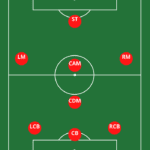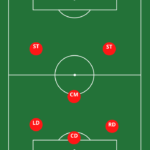- Last Updated -
Soccer Nutmeg, Lets get started…
Soccer is an incredible sport with numerous skills and techniques that make it electrifying for both players and fans. One of the most popular and skillful techniques in soccer is nutmegging. So what is a nutmeg in soccer?
Nutmegging, which is also known as Panna in street soccer, is a technique used by players to maneuver the ball through an opponent’s legs. It’s a classic move that always brings excitement to the game.
The origins of nutmegging are unclear, but some accounts suggest that it dates back to early football games played on the streets of England in the mid-19th century. The word nutmeg has its roots in 16th-century England where it referred to a hard-shelled aromatic spice used for various culinary purposes.
Nutmegging refers to putting the ball between an opponent’s legs while running with possession of the ball. It’s a crafty way of tricking opponents and can be done while dribbling or passing, making it a versatile move.
Interestingly, many successful nutmegs tend to happen by accident, leading players to celebrate this unintentional feat even more. In modern-day soccer matches, nutmegging has become a vital part of many players’ skillset.
Professionals like Lionel Messi and Cristiano Ronaldo often use this move to deceive their opponents and create scoring opportunities for themselves or their team members. Nutmegging can change the psychology of a game by disrupting defenders’ concentration and creating more space for attackers to weave their way past them.
Overall, Nutmegging is an essential skill that every soccer player should learn if they want to be competitive on the field. In this article, we will explore everything you need to know about Nutmegging – from its origin story down to how you can use this move strategically during your next match.
Tracing the Roots of Nutmegging
Nutmegging, also known as “pegging,” has been a part of soccer for a long time.
It is an art that involves passing the ball through an opponent’s legs and then quickly running past them to regain possession of the ball. But where did it all begin?
The origin of nutmegging in soccer can be traced back to England in the 1800s. At that time, soccer was a physical and aggressive sport, and players were always looking for new ways to outsmart their opponents.
Nutmegging was one such way. However, it wasn’t until the early 1900s that nutmegging became a well-known skill among soccer players.
This was primarily due to its use by famous players like Stanley Matthews and George Best. Over time, nutmegging has become an integral part of modern-day soccer skills.
Nowadays, every player wants to master this technique as it is considered one of the most effective ways to bypass defenders and score goals. Despite its popularity in modern-day soccer, nutmegging is not limited to just this sport.
It is also used in other sports such as basketball and hockey. However, its roots remain firmly planted in the world of soccer where it continues to be celebrated as one of the most exciting skills a player can possess.
Tracing the roots of nutmegging reveals its evolution from an unknown skill used by a few players on rough pitches in England into a celebrated technique used by professionals around the world today. From George Best’s famous goal against Ian Ure in the 1963 European Cup semi-final match at Old Trafford – where he nutmegged him twice – to Lionel Messi’s countless instances on various soccer fields globally, nutmegs continue shaping up how we view soccer dribbling fundamentals today!
Nutmeg Unveiled: What Does it Mean in Soccer?
Nutmegging is a term that has been used for years in the game of soccer, and most people who follow the sport might have heard it at some point. At its core, nutmegging is a skill move where a player passes the ball between an opponent’s legs and then collects it on the other side.
It’s an incredibly satisfying move that often results in cheers from the crowd and puts opponents on their back foot. Nutmegging has become a staple of modern soccer, and many players use it during games as it can be an effective way to get past defenders or create space for teammates.
The move is all about timing, precision, and quick thinking. A successful nutmeg can lead to a breakaway goal or even just a small advantage over an opponent.
While soccer is one of the most popular sports worldwide, not everyone knows what nutmegging means. The term originated in Britain back in the 1800s when football was just starting to take shape as we know it today.
It was said that children would play games where they would kick the ball through someone’s legs (also known as “nutting” someone), and this eventually evolved into what we now call “nutmegging.” Throughout history, there have been countless instances of nutmegging on display during big matches – some players even became famous for pulling off this particular skill move with ease!
For instance, Lionel Messi is known for being one of the best at nutmegging defenders as he often uses his close control to weave his way through opposition lines. All in all, nutmegging can be described as an essential technique that every soccer player should try to master.
Whether you’re playing professionally or just playing with friends in your backyard, this skill can help you create space on the field while also adding flair to your game. It takes practice to perfect, but once you’ve got it down, you’ll be able to use nutmegging to your advantage during any soccer match.
Celebrated Practitioners of Nutmegging
Some of the greatest football players in history have made their mark on the game with their expert nutmegging skills. This technique has been used to great effect by many celebrated practitioners, such as Ronaldinho, Lionel Messi, and Cristiano Ronaldo. Ronaldinho is often regarded as one of the greatest footballers of all time, and his nutmegging skills are a big part of that reputation.
He was known for his ability to deceive opponents with quick and precise movements, often leaving them in a state of bewildered disarray. Ronaldinho’s nutmegging strategy was simple yet effective: he would use his superior dribbling skills to lure defenders into making a move before flicking the ball through their legs for an easy pass.
Lionel Messi is another player who has gained fame for his exceptional nutmegging abilities. His lightning-quick speed and agility allow him to maneuver around defenders with ease, making it almost impossible for them to keep up with him.
Messi’s mastery of soccer skills extends beyond nutmegging; he’s also known for his incredible ball control and ability to score from almost anywhere on the field. Cristiano Ronaldo is another footballer who has made a name for himself thanks in part to his impressive nutmegging abilities.
His signature step-over move often leaves opponents rooted to the spot or lunging in the wrong direction, opening up space for him or his teammates to take advantage of. Although Ronaldo is often thought of as more of a goal-scorer than a playmaker, he still manages to incorporate plenty of skillful nutmegs into his game.
Perhaps one of the most famous soccer nutmegs ever was Pele’s ‘nutmeg heard around the world’ during a 1970 World Cup match between Brazil and Uruguay. It was during this match that Pele made history by fooling two Uruguayan defenders with one swift flick – an iconic moment that will forever be remembered in soccer history.
Overall, the use of nutmegging in soccer can have a huge impact on the game. The psychological effect of being nutmegged can be devastating to defenders, leaving them feeling humiliated and defeated.
As such, mastering soccer skills like nutmegging can be an essential part of any player’s game plan. Whether it’s through practice nutmegging or simply watching the best players in action, learning how to use this technique effectively could make all the difference on the field.
The Art of Executing a Nutmeg in Soccer
When it comes to mastering soccer skills, nutmegging might seem like a simple move. But it requires great precision, timing, and creativity. How to nutmeg in soccer?
Let’s break it down. Firstly, you need to be in control of the ball and aware of the space around you.
You should see an opportunity where your opponent’s legs are slightly apart, giving you a chance to pass the ball between them. At this point, you need to make your move quickly before the window of opportunity closes.
Secondly, using the inside of your foot for a quick tap is usually more effective than using the outside or sole of your foot for a more extended touch. The inside tap makes it harder for your opponent to react quickly and close their legs.
Thirdly, mastering soccer skills like nutmegging requires an element of disguise or deception. You can do this by feinting to make a pass or shot in one direction but then passing the ball between your opponent’s legs in another direction altogether.
Remember that nutmegging can have a psychological impact on both players involved. For you as an attacker, successfully executing a nutmeg can give you confidence and momentum going forward in the game.
On the other hand, for your opponent who has just been megged (nutmegged), it can be demoralizing and lead to feelings of embarrassment. Famous soccer nutmegs have become iconic moments in soccer history – think Ronaldo’s now-legendary meg against Ray Parlour in 2006 or Ronaldinho’s flick against Chelsea that left John Terry stranded.
These players had mastered not only soccer techniques but also developed their own style when it came to nutmegging. While nutmegging may seem like just another trick in the soccer skills playbook – mastering this technique takes time and practice.
Players who want to excel at this trick must internalize their practice sessions’ technical aspects, such as timing, deception, and ball control. With dedication and practice, anyone can become a proficient nutmegger on the soccer pitch!
Strategies to Defend Against Nutmegging
Strategies to Defend Against Nutmegging Nutmegging is a tricky move that can catch even the most experienced defenders off guard.
However, there are some strategies that defenders can use to prevent their opponents from executing the move successfully. One effective strategy is to position oneself in such a way that it becomes difficult for the opposing player to get close enough for the nutmeg.
This involves keeping one’s legs slightly further apart than usual, making it harder for the attacker to thread the ball between them. This also helps in reducing the psychological impact of nutmegging as it shows that you are prepared and expectant of such moves.
Another effective strategy is to anticipate when an attacker is likely to attempt a nutmeg and adjust one’s body position accordingly. This means being aware of one’s surroundings and keeping an eye on the ball at all times.
By doing this, defenders can make it more difficult for attackers to execute a successful nutmeg. A third strategy involves using footwork and quick reflexes to intercept passes before they can be played through one’s legs.
This requires mastering soccer skills like tackling, dribbling, and passing so that you are always prepared for any eventuality on the field. Soccer match tactics can also be used to prevent nutmegging.
For instance, playing with a deeper defensive line makes it harder for attackers to get close enough for a successful nutmeg while maintaining possession in midfield ensures that you are not vulnerable when defending against fast-paced counter-attacks. While there is no foolproof way of defending against nutmegging in football, using these strategies will reduce its effectiveness and ultimately help defenders maintain control of their game.
Practicing these techniques regularly on your training ground will prepare you well ahead of your matches; who knows? You may end up stopping what could have been another famous soccer nutmeg!
The Game-Changing Nature of Nutmegging
Nutmegging, commonly referred to as ‘passement de jambes’ by French-speaking football enthusiasts, is a game-changing soccer skill that can change the pace of a match. Nutmegging in soccer involves passing the ball through an opponent’s legs and retrieving it from the other side.
The technique is an embarrassing move for the defender and usually comes with some level of humiliation. However, its impact goes beyond emotional reactions.
How to nutmeg in soccer requires a certain level of composure and creativity. It involves tricking your opponent into thinking you want to pass or shoot the ball in another direction before passing it through their legs.
Once executed successfully, you can retrieve the ball from the other side and continue moving forward with a new angle or position that wasn’t available before. The psychological impact of nutmegging on both teams is significant.
The team that executed it enjoys a surge in morale and confidence while demoralizing their opponents at the same time. The opposing team becomes vulnerable since they will be anticipating subsequent attempts from their opponent to execute more nutmegs.
Therefore, mastering this skill creates an upper hand for your team. Soccer players and nutmegging have also created iconic moments in history that are remembered even after many years have passed.
One such moment was when Cristiano Ronaldo performed an incredible nutmeg against former Liverpool defender Andrea Dossena during his Manchester United days back in the 2008/09 season at Old Trafford Stadium. Nutmegging has become more than just a skillful move for soccer players but also one that comes with psychological benefits and game-changing tactics for teams aiming to dominate matches on all fronts.
Key Takeaways
Nutmegging is a highly effective soccer technique that can turn the tide of a match if executed correctly. This skill has been around for centuries, and it continues to be celebrated by fans and players alike.
One key takeaway from this article is that nutmegging requires both skill and strategy. It’s not enough to simply try and kick the ball between your opponent’s legs; you need to anticipate their movements and use quick footwork to create an opening.
Another important takeaway is that nutmegging can have a significant psychological impact on both the player who executes it and the one who falls victim to it. A successful nutmeg can boost your confidence and demoralize your opponent, giving you an advantage on the field.
It’s worth noting that defending against nutmegging requires its own set of skills. While there are strategies you can use to try and prevent your opponent from executing a successful nutmeg, ultimately it comes down to mastering soccer skills such as quick reflexes, agility, and anticipation.
Whether you’re practicing nutmegging or defending against it, mastering this soccer technique can greatly improve your game. So next time you hit the pitch, keep these key takeaways in mind as you work towards becoming a skilled and strategic player.
FAQs
Q: What is the origin of nutmegging in soccer?
A: The exact origin of nutmegging in soccer is unclear.
However, it is believed to have originated in England during the late 1800s. It was first referred to as “popping” and later became known as “nutmegging.”
Q: Can nutmegging be executed by any player at any point during a game?
A: Yes, any player can attempt a nutmeg at any time during the game.
However, it is important to keep in mind that it can be risky and may result in loss of possession if not executed properly.
Q: Who are some famous soccer players known for their nutmegging skills?
A: There are many famous soccer players who are known for their exceptional nutmegging skills. Some notable names include Lionel Messi, Cristiano Ronaldo, Neymar Jr., Ronaldinho, and Jay-Jay Okocha.
Q: Is there a specific strategy to defend against nutmegging?
A: Yes, there are several strategies that can be employed to defend against nutmegging.
One approach is to maintain a low center of gravity and keep your legs close together to limit the space between them. Another tactic is to anticipate the move by watching the opponent’s body language closely.
Q: Are there instances of nutmegging being used in other sports besides soccer?
A: Yes, there are numerous examples of nutmegging being used in other sports as well.
In basketball, for instance, it is commonly referred to as “ankle-breaking.” It involves dribbling past an opponent by faking one way and then quickly changing direction with the ball. Overall, mastering the art of nutmegging requires consistent practice and perfecting your technique over time.
While it may be risky at times, executing a successful nutmeg can completely change the dynamics of a game and leave opponents stunned. Nonetheless, defenders must always be aware of the possibility of nutmegging and employ effective strategies to prevent it from happening.
Final Thoughts
Nutmegging is an undervalued skill in soccer that requires a lot of practice and patience to master.
It may be a simple move, but its impact on the game cannot be understated. It has the potential to turn matches around and even demoralize your opponents.
As much as nutmegging can have positive effects on your team, it is essential to remember that it is just one aspect of the game. Excellent dribbling skills, ball control, passing, and shooting proficiency are all fundamental aspects of the sport that must not be neglected in favor of nutmegging.
Players must strive to master all aspects of soccer if they hope to become truly exceptional. Moreover, while nutmegging can be a game-changer in soccer, players must also consider whether it is necessary at any given moment in a match or whether it will cause them more harm than good.
Sometimes making a simple pass or taking a shot could be more effective than attempting a risky nutmeg. Nutmegging has always been an exhilarating aspect of soccer since its inception centuries ago.
Although sometimes seen as cheeky or unnecessary by some coaches and players alike, Nutmegging can significantly affect both the outcome of matches and their psychological effect on opponents. So why not take some time out during your next training session or match practice sessions to work on perfecting this underrated skill?
Who knows? Maybe you could become the next iconic Soccer player known for their incredible Nutmegs!
Conclusion
Nutmegging is a powerful and strategic move in soccer that can completely change the dynamics of a game.
It’s an art that requires mastery of different skills such as dribbling, speed, and precision to execute successfully. Nutmegging is not just limited to soccer; it’s become a popular and entertaining move in other sports as well.
Defending against nutmegging can be challenging, but with the right strategies, it can be done. A defender needs to stay alert at all times and anticipate the attacker’s moves.
They need to keep their legs close together to avoid giving the attacker an opportunity for a successful nutmeg. Nutmegging has been around since the early days of football, and its origin remains somewhat unclear.
However, it’s clear that nutmegging is here to stay and will continue to be one of the most exciting moves in soccer history. Mastering this skill requires patience, dedication, and perseverance.
Players need to practice nutmegging regularly until they improve their technique. With hard work and determination comes success and accolades from fans all over the world.
Soccer players who have mastered this skill often become famous for their impressive nutmegs during matches. These moments are not only entertaining but also show how effective a well-executed nutmeg can be in changing the course of a game.
Mastering nutmegging takes time and effort but can pay off big time on the field. Whether you’re a beginner or an experienced player looking to improve your skills, incorporating this move into your soccer strategy can help take your game to new heights. (1)
Do Grip Socks Help In Soccer?
Do Grip Socks Help In Soccer? The Importance of Footwear in Soccer...
Read MoreWhat is a Set Piece in Soccer?
What is a set piece in soccer? Introduction Soccer is a sport...
Read MoreBreaking Down the False 9 Soccer Position
The false 9 position is a term used in soccer to describe...
Read MoreThe Changing Role of Inverted Wingers
Definition of 'Inverted Wingers' in soccer An inverted winger, also known as...
Read MoreMastering the 4-3-3 Soccer Formation
Here Are Some Teams That Have Mastered the 4-3-3 Soccer Formation -...
Read MoreThe Historical Dominance of Brazilian Soccer in the World Cup
Introduction: The Beautiful Game's Grandest Stage The World Cup, a grand tournament...
Read MoreSoccer Goalie Rules: Understanding the Goalkeeper Position
As soccer players try to gain control of the game, midfielders are...
Read MoreThe Transformation of German Soccer in the 2000s
Kickoff: A Brief Overview of German Soccer in the 2000s The Dawn...
Read MoreNutmeg in Soccer, Soccer’s Sneakiest Move
Soccer is an incredible sport with numerous skills and techniques that make...
Read MoreMastering Soccer Jargon: A Glossary for Fans and Players
Last Updated on August 27, 2024 by Andy Long Mastering Soccer Jargon:...
Read More9v9 Soccer Positions Explained
9v9 soccer, also known as small-sided soccer, is a variation of the...
Read Moresoccer position numbers quick guide
Each player on the field has an important job as it relates...
Read MoreSoccer Yellow Card … What Does It Mean?
Yellow cards are used to maintain order and fairness on the soccer...
Read MoreHow Many Soccer Games In A Season
The number of soccer games in a season varies depending on the...
Read MoreWhat is the hardest position in soccer to play?
What is The Hardest Position in Soccer Importance of understanding positions in...
Read More5 Best Soccer Cleats For Strikers in 2024
What are the Best Soccer Cleats for Strikers? The beautiful game of...
Read MoreBest Soccer Cleats for Flat Feet 2024
Unlock your soccer potential and tap into the game-changing secret: the ultimate...
Read MoreWhat is a goal kick in soccer? Soccer Law #16
Soccer is governed by a set of rules known as the Laws...
Read MoreBest Grip Socks For Soccer 2025
In this post, we present the best grip socks for soccer, so...
Read MoreBest Soccer Cleat Insoles 2024
What are the Best Insoles For Soccer Cleat? Are you a serious...
Read MoreSoccer 6-Yard Box: The Penalty Area
What is the 6-Yard Box in Soccer? The 6-Yard Box is an...
Read MoreWhat is a cap in soccer?
If you're a soccer fan, you've probably heard the term "cap" being...
Read MoreThe Mercy Rule In Soccer And The Roll It Plays
Picture this: a soccer match, with one team dominating the field and...
Read MoreWhat is a soccer penalty kick?
Soccer, also known as football, is one of the most popular sports...
Read MoreThe Transformation of Midfielders Roles in Soccer
The Transformation of Midfield Roles in Soccer The Evolution of Soccer Tactics...
Read MoreSoccer’s Attacking Midfielder And The Crucial Role It Plays
The attacking midfielder position in soccer is a vital role that requires...
Read More7v7 Soccer Formations
Choosing the right 7v7 soccer formation is crucial for success on the...
Read MoreThe Impact of VAR on Modern Soccer: Video Assistant Referee
Traditional Refereeing Methods: Balancing Act on the Pitch In the realm of...
Read MoreThe Highest Scoring Games In Soccer History
Phew, after reading about the seven worst blowouts in soccer history, I...
Read MoreSoccer History USA: From Struggles to Successes
Soccer, also known as football, is the world's most popular sport, with...
Read MoreThe Golden Era of Italian Soccer in the 1990s
A Glimpse into Italy of the 90s: Culture, Politics, and Soccer As...
Read MoreBest Adidas Soccer Cleats – Top 5 Picks
choosing the right type of soccer cleat is essential for optimal performance...
Read MoreDiscover the 5 different types of soccer cleats
Introduction - A brief overview of the importance of choosing the right...
Read MoreSoccer Positions For Slower Players
Soccer is a unique sport that requires a combination of physical strength...
Read MoreBest Soccer Cleats For Midfielders 2024
The Best Soccer Cleats For Midfielders in 2023 - Our Top 5...
Read MoreWhat is a Soccer Assist?
The Importance of Teamwork in Soccer The importance of teamwork in soccer...
Read MoreWhat is a soccer tackle?
The Importance Of Mastering Tackling Skills For Success In Soccer To succeed...
Read MoreBest Laceless Soccer Cleats 2024
What Are The Best Laceless Soccer Cleats? Soccer players know the importance...
Read MoreSoccer Goal Size and Dimensions
Brief History of Soccer Soccer has been played in various forms throughout...
Read More





































